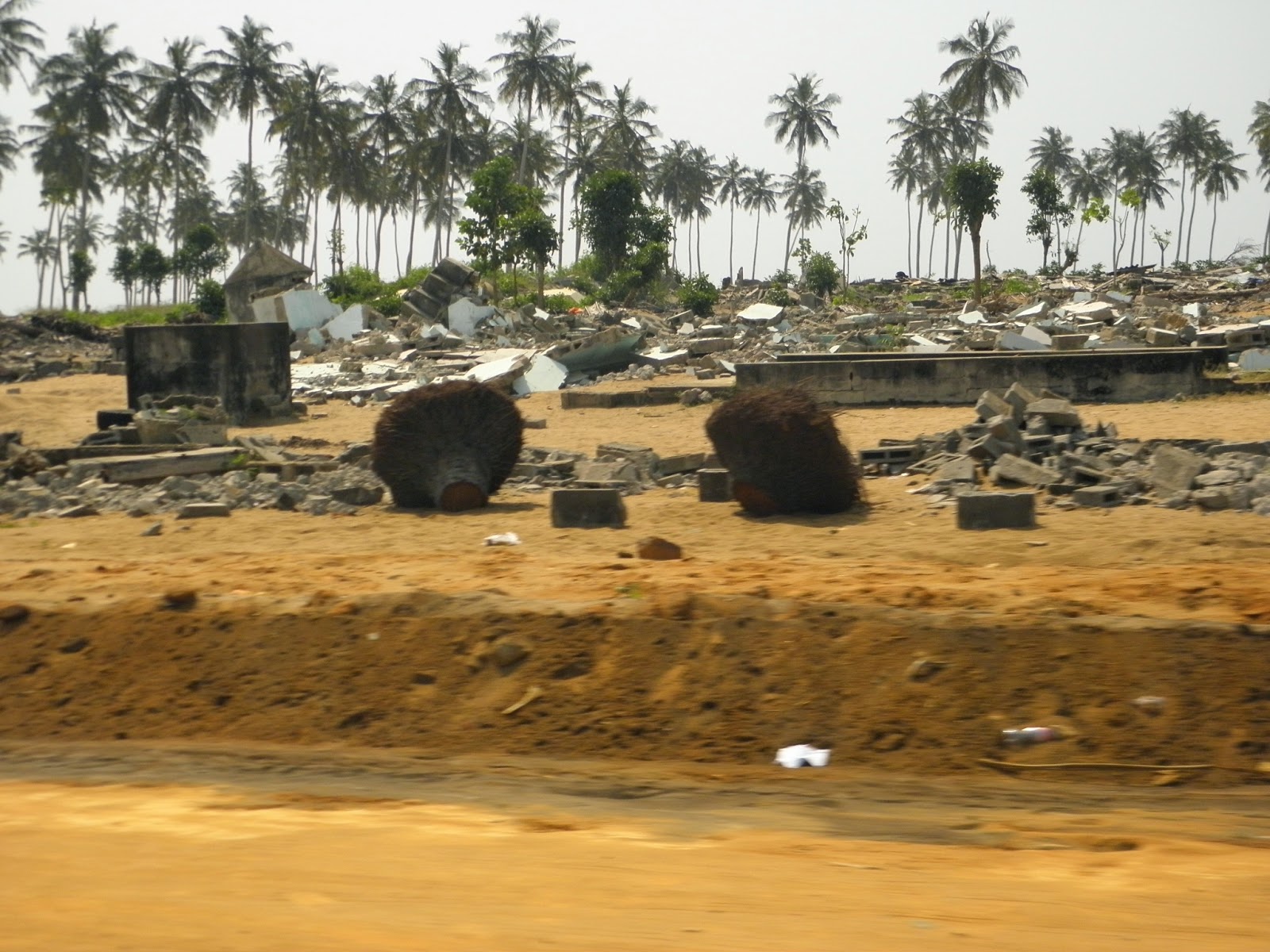Turns out the bridge wasn't the only new sight in store. The road to Bassam was littered with debris. A grand project in destruction was underway- the first step in construction, to be sure but forever the question at what cost? It would feel so much more like real progress if those whose businesses and homes were destroyed directly benefitted from whatever newness took its place. Driving past the ruins left me in a sour mood for the beach. I felt, illogically, as though my touristy beach endeavor was somehow contributing to the mess.
 |
| Kilometers and kilometers of concrete broken into rubble |
 |
| Man vs. man- woven furniture for sale among the ruins |
 |
| 100 pictures wouldn't really show the devastation |
 |
| You have to know what was there before to truly comprehend what's missing |
 |
| A shell of a stand left, or hastily built back up |
 |
| All that's left of stores and restaurants and crafty shops |
 |
| Looks like the wreckage from a hurricane (Andrew, yes, I remember seeing miles of this in South Florida) |
 |
| Oversize billboards breaking out of their frame, typical C'I style This one marks the end of the construction zone and the official entrance to Grand Bassam |
A glance at the opposite side of the street gives a clue to the masses of storefronts that have been razed on the other side. Surely they weren't much too look at but without doubt they provided the means for food and shelter to plenty. Where have they all gone?
I don't have the inside story on this one, though random people could be seen wandering amidst the ruins. Some gazing out at the ocean, some sifting through the remains and others appeared to be just taking it all in, similar to the survivors of natural disasters, walking around in shock and awe. Though in this case it was not the hand of Mother Nature to be marveled at but the will of Father Man.
Grand Bassam is a sleepy town with an artistic edge. I was transported back to my days in Key West or Woodstock. It was a cozy, comforting feel that made me want to find a place and settle in, wander the streets and become a regular. Get my art on.
The buildings have a definite colonial design, many in stages of disrepair, hollow shells of their former glory. They are at once majestic and mysterious, ominous in what they hint to in the past. I wondered aloud at the history of the town and my friend remarked on a building she'd heard was used in the slave trade. The sound of crashing waves made the images in my mind come to life. Later on, as I looked out across the ocean to the distant horizon, I hovered between the present world and the past with pain in my heart.
I wondered at how the buildings could even be left standing and how the residents could continue their daily lives with such gruesome reminders of tribulations gone by. Searching online for the history of the town hasn't given many clues. Apparently named a world heritage site, complete with striking photos, but not many details. Former French capital, trading post and port. That's all it says. I guess we are left to infer what was being traded.
The UNESCO site is even more cryptic, referring to a multiethnic capital with complex, yet harmonious, social relations and 'principals of hygiene' used in the town planning. Not enough details about what this means to satisfy curiosity or provide a clear history of the area. This post includes one small comment that lets me know I am not alone in wondering if the buildings aren't a bane on current residents. Phrases like "historical significance" and "French colonial charm" baffle me. From my current knowledge base, minimal to low for certain, I cannot imagine anything charming or significant(ly worth saving) from colonial rule.
Obviously it is time for me to get my history on. And while a part of me gets the idea that preserving places from the past is important, and about more than just the pretty moments, I felt that same anger and revulsion I had during early tours of Kinshasa that highlighted Stanley's "discoveries" and the old, old church -Sims church. My rejection stems from the fact that I want to know more about the African history of these places, the African developments and importance. Impossible to extricate. The European history in Africa is oft times the only history to find. But what of those who were there before? First and always?
Needless to say, my trip to the beach lost most of its charm to these thoughts. The rough breaking waves were a good fit for my confusion and melancholy.
And the only bright spot to my research? This gem of an institution which makes me want to overhaul my resume yet again in hopes of finding a good fit on the faculty here.
In the end, the ocean experience made both boys' grateful lists, which in turn made me grateful. A little bit of pleasure for them and a mind full of things to contemplate for me = a day well spent.
 |
| Eerie shell of a house |
 |
| If all those haunted houses could be made into houses of art, maybe some healing could occur |
 |
| The empty beach everyone is writing about |
 |
| Rough waves make the boys happy and fit my mood |
 |
| Nothing beautiful about this horse on the beach. The riders tap him with the switch all day. |
 |
| Mid afternoon the empty beach came alive |
 |
| Soccer partners and good waves is pretty much all Mohamed needs to make his grateful list |
















